Tag : novel
May 2, 2019 by Yona Zeldis McDonough
The Object of Your Affections: What’s a Baby Between Friends?
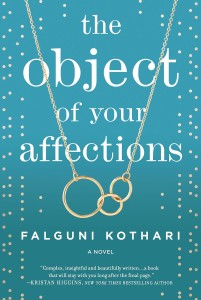
Two best friends undergo a bitter falling out and a tearful coming back together. But this is no ordinary rapprochement—because one of the women asks her friend to be the surrogate who carries her child. Author Falguni Kothari talks to Lilith’s fiction Editor Yona Zeldis McDonough about the complex, delicate nature of such a relationship, and how it set the plot for her new novel in motion.
- No Comments
April 25, 2019 by Eleanor J. Bader
Revisiting the Turmoil of the Late 60s, In Fiction
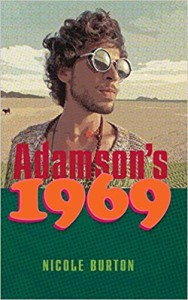 Nicole Burton’s sweeping first novel, Adamson’s 1969, (Apippa Publishing Company) tells the story of Henry Adamson, a young British immigrant to the U.S. whose arrival coincides with some of the most dramatic political movements and events of the late twentieth century.
Nicole Burton’s sweeping first novel, Adamson’s 1969, (Apippa Publishing Company) tells the story of Henry Adamson, a young British immigrant to the U.S. whose arrival coincides with some of the most dramatic political movements and events of the late twentieth century.
It’s 1969, the year of Woodstock, numerous massive anti-war protests, multiple plane hijackings and growing pushback against repressive gender norms. And Adamson—he prefers to be addressed solely by his surname—pays attention to each unfolding event as he is trying to finish high school and figure out the college application process, all of it done without parental counsel.
- 1 Comment
April 22, 2019 by Yona Zeldis McDonough
A Novel Bends Time at the Onset of the Holocaust
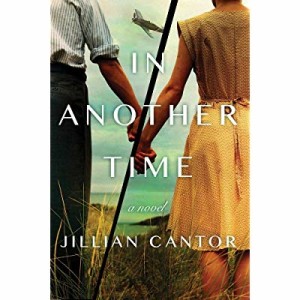
A talented young female musician, the bookselling man who loves her and a quasi-magical way to escape the rising Nazi horror in Germany are the key elements in Jillian Cantor’s latest novel, In Another Time.
Below she chats with Fiction Editor Yona Zeldis McDonough about how she crafted this original and compelling story that asks whether it’s really possible to escape the horrors of history.
- 1 Comment
April 17, 2019 by Yona Zeldis McDonough
The Story of a Storyteller

Longtime Lilith readers may remember Miryam Sivan’s name; her story Roadkill appeared in the magazine in 2003 and City of Refuge was featured in 2011.
Now she’s back with her debut novel, Make It Concrete, which is set in contemporary Israel and follows a woman who transcribes Holocaust stories. Sivan talks to fiction editor Yona Zeldis McDonough about how the past shapes and even defines the present.
- No Comments
April 9, 2019 by Yona Zeldis McDonough
A Jewish Beauty’s Journey, in Fiction

Entertaining and witty, Susan Dworkin’s novel, The Garden Lady—chronicling a woman of notable beauty—nonetheless asks some penetrating questions about the lies we tell ourselves in order to keep going.
Fiction Editor Yona Zeldis McDonough talks to Dworkin, a feminist who worked at Ms. in its early days, about what Gloria Steinem called her “new dreams of justice” and how she’s pursued them both in this novel and elsewhere.
- No Comments
March 22, 2019 by Yona Zeldis McDonough
A Breathtaking Novel Set on the Eve of World War I
 Set in the years before and just leading into World War I, House of Gold is a vast, enthralling tapestry of a novel. The story moves seamlessly from character to character and place to place, all the while picking up speed and momentum as the war looms ever closer.
Set in the years before and just leading into World War I, House of Gold is a vast, enthralling tapestry of a novel. The story moves seamlessly from character to character and place to place, all the while picking up speed and momentum as the war looms ever closer.
Fiction Editor Yona Zeldis McDonough chats with author Natasha Solomons to ask her about what drew her to the subject and what she learned along the way.
- No Comments
March 19, 2019 by Yona Zeldis McDonough
The Jewish Doctor Writing About Medieval Christian Spirituality
I met Melodie Winawer in a Brooklyn synagogue; so when I learned that she had written a novel steeped in Christian imagery and ritual, I just had to know why!
Equally interesting was Winawer’s background—she holds degrees in biological psychology, medicine and epidemiology. Below, Winawer talks to Lilith about her fascinating dual life as doctor/novelist, her attraction to history and so much more.
- No Comments
September 12, 2018 by Kitty Zeldis
Anti-Semitism Among the WASP Elite
The idea for my novel Not Our Kind was born at Vassar College, where I was a student in the 1970s, where there was enough visible diversity to make a Jewish girl feel she was not alone. I encountered plenty of Jews, both students and faculty. Yet while I didn’t experience much overt anti-Semitism, I felt keenly aware that Vassar had historically excluded people like me—I was the “not our kind” of my eventual novel’s title.
I could feel it in the manners, the mores, the very air around me. Vassar was a WASP institution and bastion, and I knew I didn’t entirely belong. In fact, it was at Vassar that I acquired the nickname that became my pen name. I had commented to a friend that my Hebrew first name and Polish surname felt all wrong and that I should have been called Katherine Anne Worthington; he jokingly responded by calling me Kitty. It’s a name that stuck.
The anti-Semitism at Vassar was occasionally overt—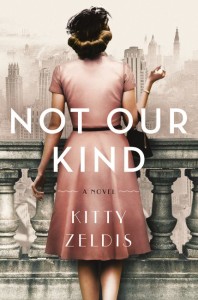 my freshman roommate casually noted, “Well, your people did murder our Lord,” a remark for which I then had no ready reply. But it was the more passive, almost nonchalant anti-Semitism that stung most. I remember an English lit class in which we’d been reading Ezra Pound and T.S. Eliot and I said that I found the stereotypical characterizations of Jews in their poetry—greedy, money-grubbing, hook nosed and so forth— upsetting. A fellow student raised his hand and said, “Oh, well, that’s what everyone was like back then,” as if that should have cancelled out my discomfort, and made it, somehow, all right. And then there was the memorable evening that I went to hear a lecture on 18th century Rococo painting that was to be given by a well-regarded scholar visiting from Germany. Before he came to the lectern, someone from the Art History department read a short bio by way of introduction. I don’t know what I expected to hear, but it surely wasn’t that during World War II, this man had been a high ranking official—a commander, a general, I don’t recall which—in the military. A Nazi, in other words, though the word was not actually said.
my freshman roommate casually noted, “Well, your people did murder our Lord,” a remark for which I then had no ready reply. But it was the more passive, almost nonchalant anti-Semitism that stung most. I remember an English lit class in which we’d been reading Ezra Pound and T.S. Eliot and I said that I found the stereotypical characterizations of Jews in their poetry—greedy, money-grubbing, hook nosed and so forth— upsetting. A fellow student raised his hand and said, “Oh, well, that’s what everyone was like back then,” as if that should have cancelled out my discomfort, and made it, somehow, all right. And then there was the memorable evening that I went to hear a lecture on 18th century Rococo painting that was to be given by a well-regarded scholar visiting from Germany. Before he came to the lectern, someone from the Art History department read a short bio by way of introduction. I don’t know what I expected to hear, but it surely wasn’t that during World War II, this man had been a high ranking official—a commander, a general, I don’t recall which—in the military. A Nazi, in other words, though the word was not actually said.
- 1 Comment
May 23, 2018 by Yona Zeldis McDonough
A Novel Imagines F. Scott Fitzgerald’s Lesser-Known (and Jewish) Love Affair
In 1937 Hollywood, gossip columnist Sheilah Graham’s star is on the rise—while literary wonder boy F. Scott Fitzgerald’s career is slowly drowning in booze. But the once-famous author, desperate to make money penning scripts for the silver screen, is charismatic enough to attract the gorgeous Miss Graham, a woman who exposes the secrets of others while carefully guarding her own. Like Fitzgerald’s hero Jay Gatsby, Graham has meticulously constructed a life far removed from the poverty of her childhood in London’s slums. And like Gatsby, the onetime guttersnipe learned early how to use her charms to become a hardworking success; she is feted and feared by both the movie studios and their luminaries.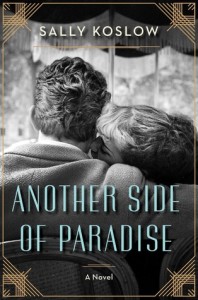
A notorious drunk famously married to the doomed Zelda, Fitzgerald fell hard for his “Shielah” (he never learned to spell her name), who would stay with him and help revive his career until his tragic death three years later.
Working from Sheilah’s memoirs, interviews, and letters, Sally Koslow revisits their scandalous love affair and Graham’s dramatic transformation in London in her new novel, Another Side of Paradise, out this month from HarperCollins.
Koslow, the former editor-in-chief of McCall’s Magazine and author of four other novels, including acclaimed international bestseller The Late, Lamented Molly Marx, talks to Fiction Editor Yona Zeldis McDonough about how she came to uncover the secrets of Graham’s past—and why.
- 2 Comments
July 1, 2014 by Yona Zeldis McDonough
Golden Words: Q&A With Author, Editor, Activist Nora Gold
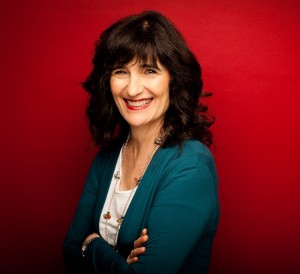
Nora Gold (source: NoraGold.com)
Nora Gold’s recently published Fields of Exile, a pathbreaking novel about anti-Israelism in academe, was picked by The Forward as one of “The 5 Jewish Books to Read in 2014,” and has received enthusiastic praise from many quarters.
But this is not the first time Gold has received acclaim for her work; Marrow and Other Stories won a Canadian Jewish Book Award, and was praised by Alice Munro. And Gold’s story, Yosepha, appeared in the spring 1985 issue of Lilith.
Gold is also the creator and editor of the online literary journal Jewish Fiction.net, a blogger for “The Jewish Thinker” at Haaretz, and Writer in Residence and an Associate Scholar at the Centre for Women’s Studies in Education at OISE/University of Toronto. She and Lilith’s fiction editor Yona Zeldis McDonough discussed the role ideas play in the creation of a novel, the meaning Zionism continues to have in the Diaspora and the siren song of the short story.
 Please wait...
Please wait...